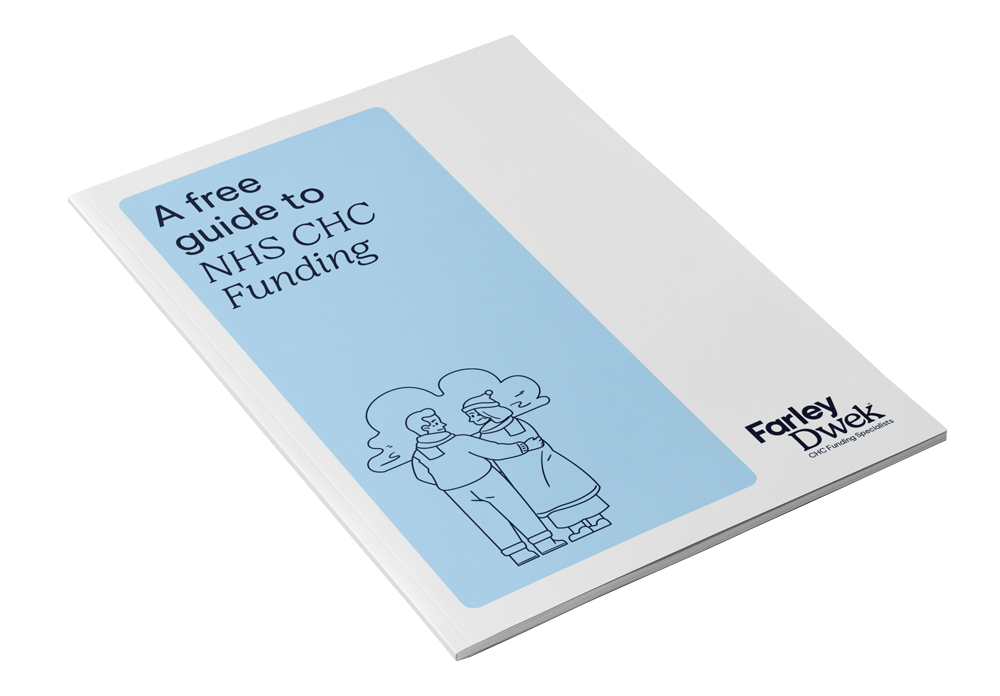CHC Checklist
Wherever there may be a need, the NHS must undertake an assessment to determine eligibility for Continuing Healthcare Funding. This process is done in two stages.
The first stage is called a CHC Checklist. The Checklist is a useful preliminary ‘screening’ tool, designed to filter out those who clearly do not qualify for CHC funding. Only those who score highly enough on the Checklist will trigger for the next stage – Full Assessment by a Multidisciplinary Team, using the Decision Support Tool.
Who can complete a CHC checklist?
The Checklist is most often completed by a Social Worker, but can be undertaken by a range of professionals involved in the individual’s care. The best person to ask usually depends on the setting.
If your relative is living in their own home, speak to their social worker, GP or District Nurse to request a Checklist be completed. If none of these people are forthcoming, contact your local Integrated Care Board for help.
If your relative is already in a care or nursing home, ask the Clinical Lead, Senior Carer or Manager to complete the Checklist. If they refuse, contact your Social Worker or ask the Integrated Care Board to help you.
Since the July 2022 revisions to the National Framework came into effect, it is now ‘preferable’ for the Checklist to be completed after discharge from hospital, once the individual’s ongoing needs are clear. This is because people present differently in an acute hospital than they do in the community.
If the individual is discharged from hospital to a nursing home for the first time, a Checklist should almost always be completed once a settling in period has passed.
In the meantime, an interim package of care may be put in place to ensure there is no gap in meeting their needs. This is often called “Discharge to Assess” or “D2A”.
If a period of rehabilitation is required after hospital discharge, CHC assessment should be deferred until such intervention is complete. This will ensure the long-term care needs are clear.
There is also a Fast Track Pathway tool for those whose condition is rapidly deteriorating, usually as they near the end of their life.

CHC Checklist Scoring
The Checklist can be completed by a variety of health and social care practitioners, who have been trained in its use, including, for example: a registered nurse employed by the NHS, GPs, other clinicians or local authority staff (such as social workers, care managers or social care assistants).
The Checklist looks at 11 criteria called Care Domains, which are:
- Breathing *
- Nutrition
- Continence
- Skin integrity
- Mobility
- Communication
- Psychological/Emotional needs
- Cognition
- Behaviour *
- Drugs/Mediation/Symptom Control *
- Altered states of consciousness *
The outcome of the Checklist depends on the aggregate number of A’s, B’s, and C’s scored. Generally speaking, in order for the ICB to consider doing a comprehensive Full Assessment, you have to have a minimum ‘score’ in the Checklist:
- 2 or more ‘A’s
- 5 or more ‘B’s (or 1 A and 4 Bs)
- or at least 1 A in a domain with an asterisk*
The threshold at Checklist stage has been set deliberately low to ensure that anyone who may meet the criteria for CHC Funding is referred for a Full Assessment.
After the Checklist has been completed, you should receive a formal letter confirming the outcome and enclosing a copy of the Checklist.
In many cases, your relative will automatically progress to the next stage of the process – the Full Assessment. However, some people do not meet this threshold; in which case, the letter should explain how to challenge the outcome, if you disagree.
If your relative does not trigger for a Full Assessment, responsibility for meeting their care needs passes to Social Services, and they will be subject to means-testing.
Nevertheless, knowing your relative’s scores on the Checklist sets a baseline for future assessments, enabling you to note any deterioration in their condition over time. You can refer to the Checklist as the basis to request a reassessment if their needs increase.
In some circumstances, your relative’s healthcare needs will be so obvious that a Checklist is not required and they will proceed directly to Full Assessment.
How to ensure you are properly assessed
You can, of course, deal with the NHS yourself in navigating the Checklist. Make sure you familiarise yourself with the National Framework and Checklist tool.
We have produced a Free Guide to CHC Funding to help you understand how the process works which you can download for FREE.
However, our clients often tell us that this is a difficult, emotionally draining and complex process. We have developed our Checklist Support Service and MDT Advocacy Service to provide you with expert support and representation throughout the screening and assessment process.



